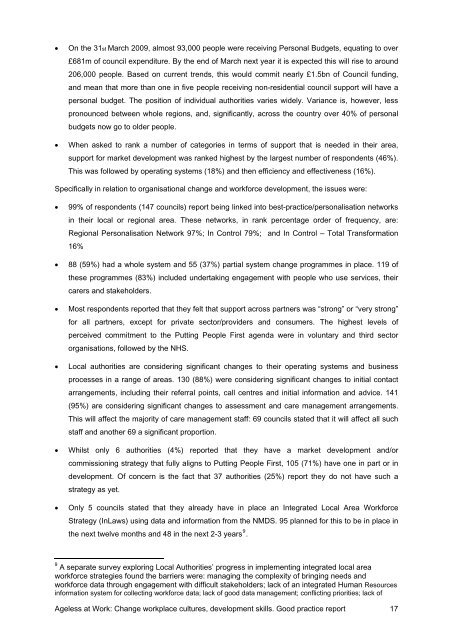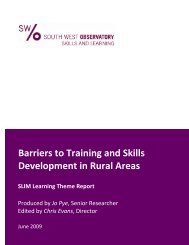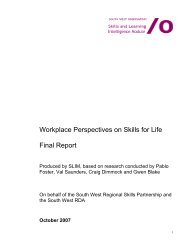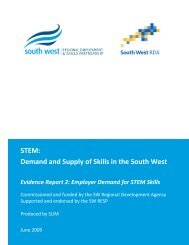Ageless at Work - Skills for Care
Ageless at Work - Skills for Care
Ageless at Work - Skills for Care
Create successful ePaper yourself
Turn your PDF publications into a flip-book with our unique Google optimized e-Paper software.
On the 31st March 2009, almost 93,000 people were receiving Personal Budgets, equ<strong>at</strong>ing to over<br />
£681m of council expenditure. By the end of March next year it is expected this will rise to around<br />
206,000 people. Based on current trends, this would commit nearly £1.5bn of Council funding,<br />
and mean th<strong>at</strong> more than one in five people receiving non-residential council support will have a<br />
personal budget. The position of individual authorities varies widely. Variance is, however, less<br />
pronounced between whole regions, and, significantly, across the country over 40% of personal<br />
budgets now go to older people.<br />
When asked to rank a number of c<strong>at</strong>egories in terms of support th<strong>at</strong> is needed in their area,<br />
support <strong>for</strong> market development was ranked highest by the largest number of respondents (46%).<br />
This was followed by oper<strong>at</strong>ing systems (18%) and then efficiency and effectiveness (16%).<br />
Specifically in rel<strong>at</strong>ion to organis<strong>at</strong>ional change and work<strong>for</strong>ce development, the issues were:<br />
<br />
<br />
<br />
<br />
<br />
<br />
99% of respondents (147 councils) report being linked into best-practice/personalis<strong>at</strong>ion networks<br />
in their local or regional area. These networks, in rank percentage order of frequency, are:<br />
Regional Personalis<strong>at</strong>ion Network 97%; In Control 79%; and In Control – Total Trans<strong>for</strong>m<strong>at</strong>ion<br />
16%<br />
88 (59%) had a whole system and 55 (37%) partial system change programmes in place. 119 of<br />
these programmes (83%) included undertaking engagement with people who use services, their<br />
carers and stakeholders.<br />
Most respondents reported th<strong>at</strong> they felt th<strong>at</strong> support across partners was “strong” or “very strong”<br />
<strong>for</strong> all partners, except <strong>for</strong> priv<strong>at</strong>e sector/providers and consumers. The highest levels of<br />
perceived commitment to the Putting People First agenda were in voluntary and third sector<br />
organis<strong>at</strong>ions, followed by the NHS.<br />
Local authorities are considering significant changes to their oper<strong>at</strong>ing systems and business<br />
processes in a range of areas. 130 (88%) were considering significant changes to initial contact<br />
arrangements, including their referral points, call centres and initial in<strong>for</strong>m<strong>at</strong>ion and advice. 141<br />
(95%) are considering significant changes to assessment and care management arrangements.<br />
This will affect the majority of care management staff: 69 councils st<strong>at</strong>ed th<strong>at</strong> it will affect all such<br />
staff and another 69 a significant proportion.<br />
Whilst only 6 authorities (4%) reported th<strong>at</strong> they have a market development and/or<br />
commissioning str<strong>at</strong>egy th<strong>at</strong> fully aligns to Putting People First, 105 (71%) have one in part or in<br />
development. Of concern is the fact th<strong>at</strong> 37 authorities (25%) report they do not have such a<br />
str<strong>at</strong>egy as yet.<br />
Only 5 councils st<strong>at</strong>ed th<strong>at</strong> they already have in place an Integr<strong>at</strong>ed Local Area <strong>Work</strong><strong>for</strong>ce<br />
Str<strong>at</strong>egy (InLaws) using d<strong>at</strong>a and in<strong>for</strong>m<strong>at</strong>ion from the NMDS. 95 planned <strong>for</strong> this to be in place in<br />
the next twelve months and 48 in the next 2-3 years 9 .<br />
9 A separ<strong>at</strong>e survey exploring Local Authorities’ progress in implementing integr<strong>at</strong>ed local area<br />
work<strong>for</strong>ce str<strong>at</strong>egies found the barriers were: managing the complexity of bringing needs and<br />
work<strong>for</strong>ce d<strong>at</strong>a through engagement with difficult stakeholders; lack of an integr<strong>at</strong>ed Human Resources<br />
in<strong>for</strong>m<strong>at</strong>ion system <strong>for</strong> collecting work<strong>for</strong>ce d<strong>at</strong>a; lack of good d<strong>at</strong>a management; conflicting priorities; lack of<br />
<strong>Ageless</strong> <strong>at</strong> <strong>Work</strong>: Change workplace cultures, development skills. Good practice report 17








